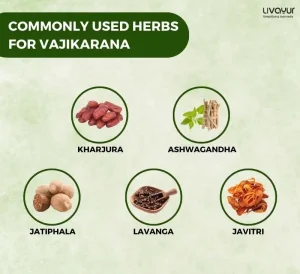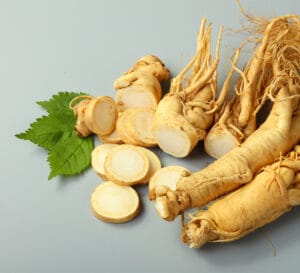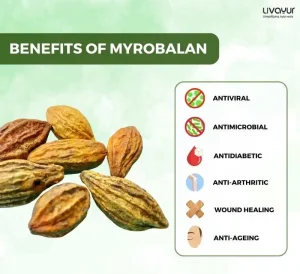
Maintaining a healthy body weight is crucial for your overall health. Excess weight or obesity can cause many health problems such as diabetes, high blood pressure, heart disease, etc. Fortunately, Ayurveda offers a simple, holistic, and effective approach to weight loss.
Basics of Ayurveda for Weight Loss
In the Ayurveda for weight loss concept, individuals who need to lose weight have an excess of Meda and Mamsa Dhatu. Meda stands for fat or adipose tissue, while Mamsa stands for muscle tissue. When there is an excess of Meda and Mamsa, the condition is called obesity or Ati Sthaulya. Consuming excess calories and the wrong foods may lead to Santarpanottha Vikaras, one of which is Atisthaulya. [1] Also, Ayurveda links the state of being overweight or obese with the vitiated Kapha Dosha. [2] Hence, the weight loss treatment in Ayurveda usually involves pacifying Kapha Dosha through diet, herbs, and lifestyle changes.
Ayurveda Weight Loss Diet: Tips & Strategies
Eat a Kapha-Pacifying Diet: [4]
As Kapha is a leading factor in increasing weight, it is important to eat a Kapha weight loss diet.
- Eat warm, light, bitter, pungent, and astringent foods.
- Limit heavy, oily, sweet, sour, and salty foods.
- Avoid eating dairy products.
- Eat fruits that have an astringent taste, such as apples, cranberries, mangoes, and peaches.
- Include leafy vegetables in your diet that are grown above ground.
- Reduce the consumption of nuts and seeds.
- Include warming spices such as black pepper, dried ginger, turmeric, cumin, and cinnamon.
The above-mentioned tips about the Kapha diet for weight loss may help you pacify Kapha.
Eat Three Meals Each Day:
Adequate food and nutrition are necessary for weight loss as your body needs constant fuel to maintain a healthy metabolism. Therefore, Ayurveda recommends eating three healthy and satisfying meals every day without snacking in between. It will help stimulate the digestive fire and boost metabolism in the body.
Do Not Eat Snacks in Between Meals:
Eliminating snacking from your dietary regime is essential for weight loss. According to Ayurveda, the digestive fire remains strong only when it can fully digest one meal before consuming another. Therefore, Ayurveda recommends separating meals by at least 4 hours and not munching snacks during this time.
Eat a Heavy Lunch and a Light Dinner:
The digestive strength of the body is the strongest from 11 am to 2 pm. Hence, Ayurveda recommends eating a heavy meal during lunchtime. It is also recommended to make your dinner as light as possible and ideally take it before 7 pm. The digestive strength of the body is weakest during this time, and a light dinner helps your stomach to empty itself before sleeping.
Drink Lukewarm Water with Lemon:
Begin your day with a glass of lukewarm water mixed with some lemon juice. It will help detoxify the body, stimulate the digestive system, enhance metabolism, and break excess fat in the body. It will also make you feel more energized in the morning. [5]
Stimulate Your Digestive Fire Before Meals:
You can also stroke the digestive fire before meals to boost digestion and metabolism. To do this, take a slice of fresh ginger and add a pinch of salt, a few drops of lime juice, and ¼ teaspoon of honey to it. Chew this ginger slice 30 minutes before eating your lunch and dinner.
Eat According to the Season and Region:
Ayurveda stresses Ritucharya, which means seasonal regime. When you eat foods according to seasons and regions, your body naturally digests and assimilates nutrients, thereby improving metabolism and preventing weight gain. [8]
Indulge in All the Six Tastes:
Ayurveda recognizes six tastes or Rasas, viz sweet, sour, salty, pungent, bitter, and astringent. You must incorporate all these six tastes in your diet to improve digestion and metabolism and maintain the proper balance in the body. [6]
Include Herbs in Your Diet:
Ayurveda also recommends taking certain herbs for weight loss, such as Triphala, Guggul, Haridra, Kalonji, Punarnava, and Ghrita Kumari (Aloe Vera). They are known to enhance metabolism and digestion and shed excess body weight. [7] However, the usage and dosage of these herbs depend on many other factors. Therefore, you should take them only after consulting an Ayurvedic doctor.
Practice Mindful Eating:
Offer your complete presence to the food while eating. Understand your body’s signs when you are satisfied or full. It will help digest the food better, reduce the chances of overeating, encourage satisfaction, and prevent unwanted cravings between meals. [11]
More Tips for Weight Loss in Ayurveda
- Practice Yoga and Pranayama every day. It will help to develop muscle tone and boost metabolism in the body. Some of the best Yoga Asanas for weight loss in Ayurveda are Surya Namaskar (Sun Salutation), Virabhadrasana (Warrior Pose), Dhanurasana (Bow Pose), Konasana (Angle Pose), Utkatasana (Chair Pose), Setu Bandha Sarvangasana (Bridge Pose) and Bhujangasana (Cobra Pose). [9]
- Meditate every day to reduce stress and calm your nervous system.
- Wake up and sleep on time. Go to bed by 10 pm and wake up before 6 am. It will help to align your body with the circadian rhythm and maintain the balance of the body, mind, and spirit.
- Get sufficient sleep. Good quality of seven to nine hours of sleep is essential to detoxify the body and maintain healthy levels of cortisol, a stress-response hormone that leads to weight gain. [10]
Kapha Weight Loss Diet: A Sample Diet Plan
Looking for an easy-to-follow Kapha diet for weight loss? Here it is: [12]
| Timing | Food Options |
| 7 am | Gruel made from 100 grams of Kulatha (Horse Gram) /Mudga (Green Gram) |
| 10 am | 200 ml of Takra (Buttermilk) |
| 1 pm | 2 Chapatis made of 50 grams of Yava (Barley) flour and Vegetables (100 grams of leafy vegetables like amaranth/fenugreek/spinach) / (100 grams of non-leafy vegetables like tomato, ash gourd, cabbage, beans)/ (25 grams of root veggie like carrot or German turnip) |
| 4 pm | 100 grams of mixed salad |
| 7 pm | 2 Chapatis made of 50 grams of Yava (Barley) flour and Vegetables (100 grams of leafy vegetables like amaranth/fenugreek/spinach) / (100 grams of non-leafy vegetables like tomato, ash gourd, cabbage, beans)/ (25 grams of root veggie like carrot or German turnip) |
| 8 pm | 200 ml of skimmed milk |
Precautions to keep in mind
While Ayurveda aids in sustainable weight loss, it is important to keep some precautions in mind and consult a medical professional before making any dietary modifications:
- All herbs and food combinations recommended for weight loss by Ayurveda may not be safe during pregnancy and breastfeeding.
- According to Ayurveda one needs to consume a hypocaloric diet to lose weight. However, the extent of calorie intake should be determined by an Ayurvedic doctor as hypocaloric diets may be harmful for certain age groups such as middle-aged people and young adults.
- Individuals with underlying health issues like anemia, thyroid gland malfunctioning, diabetes, etc need to consult a doctor before making some major dietary changes to lose weight.
Certain Ayurvedic food items and herbs may interact with medications one is already consuming.
1. What are the different types of weight gain?
When you put on weight, you can develop two types of fat accumulation patterns as discussed below:
• When fat accumulates at the waist and above it, that gives you an apple-type figure.
• When fat accumulates below the waist; i.e. around the hips or flank area, that gives you a pear-type figure.
2. Can thermogenic foods cause weight loss?
Yes, thermogenic foods can cause weight loss. These food items can increase the metabolic rate of your body, increase calorie expenditure and fat burning, leading to weight loss.
3. What are the best Ayurvedic spices for weight loss?
Ayurveda recommends the use of certain thermogenic spices for weight loss. Some of the notable spices include cinnamon, black pepper, ginger, garlic, cardamom, and cumin.
4. What are the best Ayurvedic beverages for weight loss?
The best Ayurvedic beverages for weight loss are buttermilk or Takra, Tulsi tea, ginger tea, coriander water, fenugreek water, and Triphala juice.
5. What are the different symptoms of obesity according to Ayurveda? [3]
• Medomamsa Ati-Vriddhi (Excessive enlargement of fat and muscle tissue)
• Chala Sphik-Udara-Stana (Pendulous and large-sized Buttocks-Abdomen-Breast)
• Ayatha Upachaya Utsaha (strength disproportionate to physical growth)
Conclusion
Ayurveda provides a holistic approach to losing weight with the help of diet and lifestyle changes. It says that what to eat is as important as when and how to eat. Therefore, Ayurveda gives a few dietary guidelines to help you lose excess body weight and reclaim a lean and healthy figure. To achieve the Kapha Dosha weight loss targets, you need to essentially consume foods that can balance the imbalanced Kapha and promote a synergistic interaction between the different energies in your body.
Disclaimer
This article has been written from a health and wellness perspective and to enhance your knowledge of the subject. It is not a substitute for medical advice.
References
- Managing Obesity Through Ayurveda
- AYURVEDA AND MODERN PERSPECTIVES ON MEDA DHATU AND STHAULYA: A REVIEW
- MANAGING OBESITY THROUGH AYURVEDA
- A Review Study of Food According to Prakriti and Doshas
- Lemon Polyphenols Suppress Diet-induced Obesity by Up-Regulation of mRNA Levels of the Enzymes Involved in β-Oxidation in Mouse White Adipose Tissue
- Shadrasas (Six Types of Tastes) According To Different Ayurvedic Texts – A Literary Survey
- Review on Weight Loss Management by Herbal Therapy
- Ritucharya: Answer to the lifestyle disorders
- YOGA FOR WEIGHT REDUCTION
- Sleep Deprivation: Effects on Weight Loss and Weight Loss Maintenance
- Mindful Eating
- Showing Ayurvedic diet plan 2 and Standard diet plan 3




















